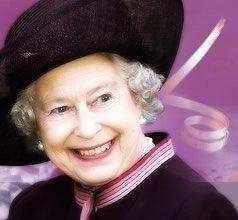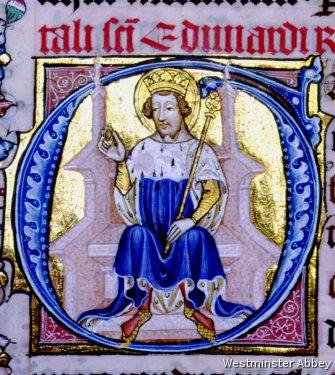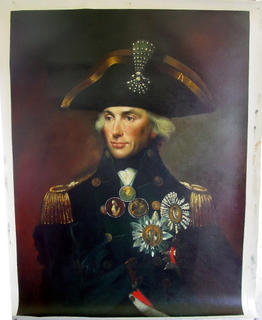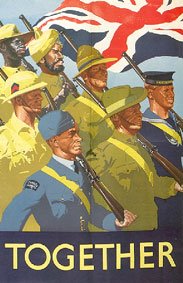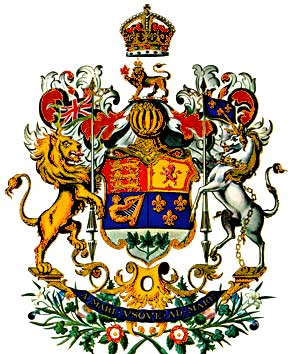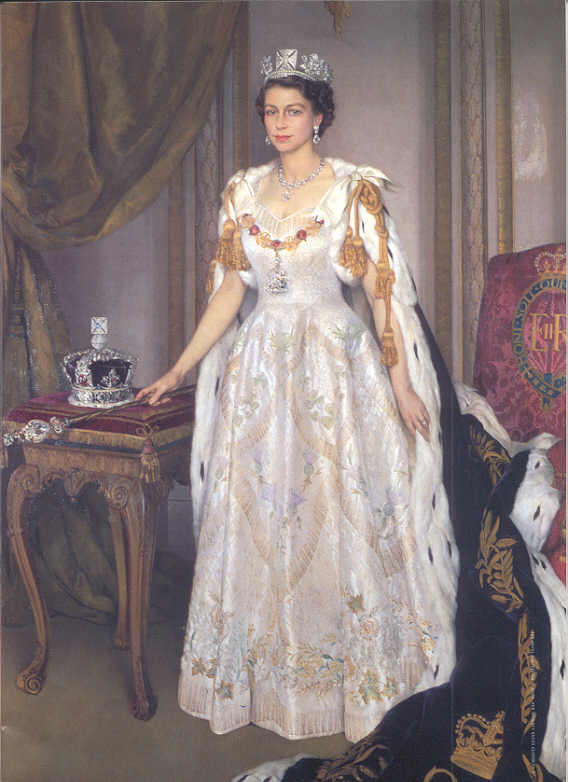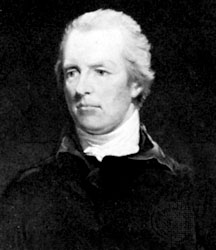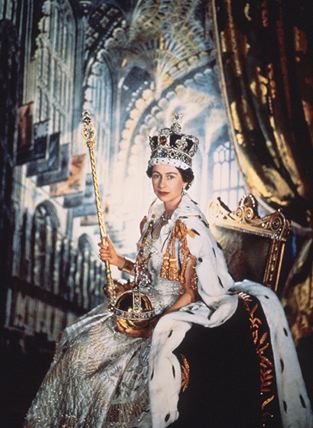[+] HONOURING OUR PATRON, SIR WINSTON CHURCHILL, VICTOR OF THE ENGLISH-SPEAKING PEOPLES
[+] HONOURING OUR QUEEN, ELIZABETH THE SECOND, ON THE 80TH YEAR OF HER BIRTH (1926 - 2006)
[+] HONOURING OUR KING, SAINT EDWARD THE CONFESSOR, ON THE 1000TH YEAR OF HIS BIRTH (1005 - 2005)
[+] HONOURING OUR HERO, LORD NELSON, ON THE BICENTENNIAL OF THE BATTLE OF TRAFALGAR (1805 - 2005)
[+] HONOURING OUR SONS, THE QUEEN'S COMMONWEALTH SOLDIERS KILLED IN THE 'WAR ON TERROR'
[+] HONOURING OUR VETS ON THE 150TH ANNIVERSARY OF THE VICTORIA CROSS (1856 - 2006)
After writing my brief defense of limited monarchy on The Monarchist blog, I got to thinking I was somewhat unfair to Pitt in that I agree that there are underlying questions that precede politics in any rational discussion. What follows is my rambling thoughts on the subject. Now from one point of view the underlying questions would include everything from the metaphysics forward. However I mean something narrower, those questions that though outside the direct realm of politics, must be discussed immediately prior to politics so that a discussion of politics can be fruitful. This is what one might call the metapolitics.
Before proceeding further a brief set of definitions is in order. By the metaphysics, I mean that which is logically prior to not only the physics, but to all knowledge. This is the realm of the basic axioms, of the formal identification of the propositions that are necessary and evident. By epistemology, I mean of course the theory of knowledge. By ethics, I mean the science of how man should act. By politics, I mean the science of how people should act in society, specifically how they should be governed.
Now I think that the Metapolitics, must begin with a brief look at the ethics. To discuss how people should act together, it is necessary to ask what should be the values of individuals in a broader sense. I have no desire to go into an in depth discussion of ethics, so I am going to simply start the discussion of metapolitics with a proposition that I believe to be true. To wit, that man should and, to the extent that they are acting rationally, men do act to preserve their own life. Now people don’t always act this way and their maybe times when it is moral to risk or even lose one’s life, but in general I hold that the standard by which one judges the actions of individuals and groups is weather they act to preserve or destroy human life.
Thus I consider electoral democracy which resolves political issues without civil war and capitalism which produces an abundance of food, clothing and other wealth to be good and communism, fascism, and other forms of dictatorship which produce civil unrest, poverty and mass death to be evil. Having established (for the purposes of discussion) a standard of value we can rationally evaluate political systems and can proceed to ask what are the basic principals of politics?
Another question that must be asked prior to a discussion of politics is, what is the nature of man? If we want to know how man should act in society, we should know what man is. Now I hold that man is an animal that can think rationally and that rational thought and actions taken on the basis of thought are man’s basic means of survival.
If human life is the standard of human action, then I hold that the purpose of society is also the furtherance of human life. That is, that people associate for their survival, procreation and happiness.
Now I think we can state the first rule or law of political association. If we associate for the furtherance and protection of our own lives, then the first rule of that association is that we agree not to kill one another. If we all just grabbed a knife and killed one another when the whim struck us, then social life would not be fruitful, it would not promote our lives. Every fruitful – legitimate society must begin with this proposition that we agree not to commit the act of wantonly taking the lives of our fellow humans. This is what I mean by the right to life.
If it is true that thought and action based on though are the primary means of human survival, and if we associate for the furtherance and protection of our own lives, then a rule of association, and a fundamental one, is that we agree that we will not stop other members of society from thinking and taking action based on that thinking in so long as they do not: violate the right to life, violate the right of other people to think and act, or violate one of the other fundamental principals of association. If we stopped our fellow men from hunting, farming, weaving, building houses, inventing new ways to produce things, thinking new thoughts, expressing those thoughts, in general taking the actions necessary to sustain their lives, then social life would not be fruitful. This principal that people have a right to think and act, is what I mean by the right to liberty.
Since the right to liberty would be without value if the consequences of a persons thought and action were not protected, a corollary principal is that person has the right to the fruit of their thought and action. If we could watch another clear and plant a field and then claim the produce as our own, or if we could take the tools that another has created, then social life would not be fruitful, it would not serve to protect human life. Every fruitful – legitimate society must protect in one form or another the right of people to the fruit of their labor, this is what I mean by the right to property.
These three principals of association, the right not to be killed, the right to take actions necessary to preserve life, and the right to the fruit of those actions are the fundamental principals of politics. If a society is to be fruitful, if it is to promote human life, it must hold the principals of life, liberty, and property to be as sacred as the church catholic holds the doctrine of the holy trinity.
A corollary of these first three principal is a fourth the right to self defence. Since I have right not to be killed by my fellow men, I have a right to defend my self by the use of force, even up to the use of deadly physical force in the defense of my life. Since the rights to liberty and property are corollary principals necessary to the preservation of life it follows that the violation of these rights are also cause for the use of defensive force and sometimes deadly force. For example if a person was taking property that represented the difference between life and death the victim would have the right to use deadly force to halt the crime.
Here however we reach a problem. A person stops a man from taking some action is he interfering with the first person’s liberty or is he defending his property? A person is dead, did the killer commit murder or did he kill in self defense? How is this to be determined? A person attempts to commit murder, the victim uses force of a potentially lethal variety in self defense, the aggressor’s relative comes to the aggressor’s defense perhaps in all good conscience not having seen the initial act. Clearly without a system of objective tribunals to determine the facts, society is perpetually on the verge of braking down into gang warfare. This is in fact the state man existed in for most of human history, in bands or tribes small enough that everyone knew what everyone else was doing so that disputes could be decided by the band.
In order for society to advance beyond the stage of a hunter gatherer band, tribunals for the objective determination of the facts and the application of the principals of association must exist, and a force strong enough to carry out the judgment of the tribunal (at least most of the time) must exist. Further if people are not to live in fear that they are acting in a fashion that the tribunals would find objectionable, there must be a person or organization for the rendering of the decisions down into a code of rules that if followed will keep one from unknowingly committing a crime. The thing that exercises these three functions, the judicial, the executive, and the legislative is what is called the state.
These functions can be organized in a number of different ways which are different forms of government. There are three classical pure forms discussed by the ancients.
These three functions could be exercised by one man alone or by one man with subordinates to assist him. This would be an absolute monarchy. All three functions could be exercised by a council of wise men or local leaders by themselves or with subordinates to assist them in which case you would have an absolute aristocracy. If all three functions are exercised by the whole people directly then one has an absolute direct democracy.
The classical writers all spoke against these three pure forms because they believed they inevitably devolved rapidly into a corrupted form: Monarchy into Dictatorship, Aristocracy into Oligarchy, and Democracy into Mob Rule. They believed a stable system would be one where the one, the few, and the many would all have some degree of authority.
For example, the executive authority could be vested in a Monarch who with his subordinates would enforce the rulings of the courts He could have the authority to nominate judges and could have a veto over legislation. A council of nobles could confirm or reject the men nominated as judges, act as the highest tribunal, and have part of the legislative authority. A council of persons elected by the freemen of the kingdom could hold part of the legislative authority and could raise money to support the state.
This is of course the classic form of the British constitution.
If instead an elected head of state was substituted for the Monarch and a council of representatives of regional governments were substituted for the council of nobles and the highest tribunal power was transferred to a supreme court, then one would have the constitution of the United States in its original form.
The question of how the various powers are best arranged is both interesting and important, but it is also perhaps beyond the topic I set out to discuss, since it is part of politics proper rather than metapolitics.
As the Anglosphere begins to organize itself, both the traditions of our past and the legitimate basis of state power must be explored. I hope this rambling discussion might be a step in that direction.


